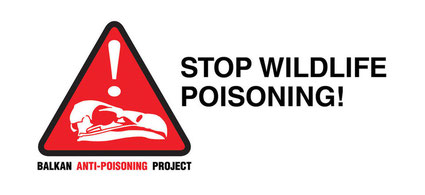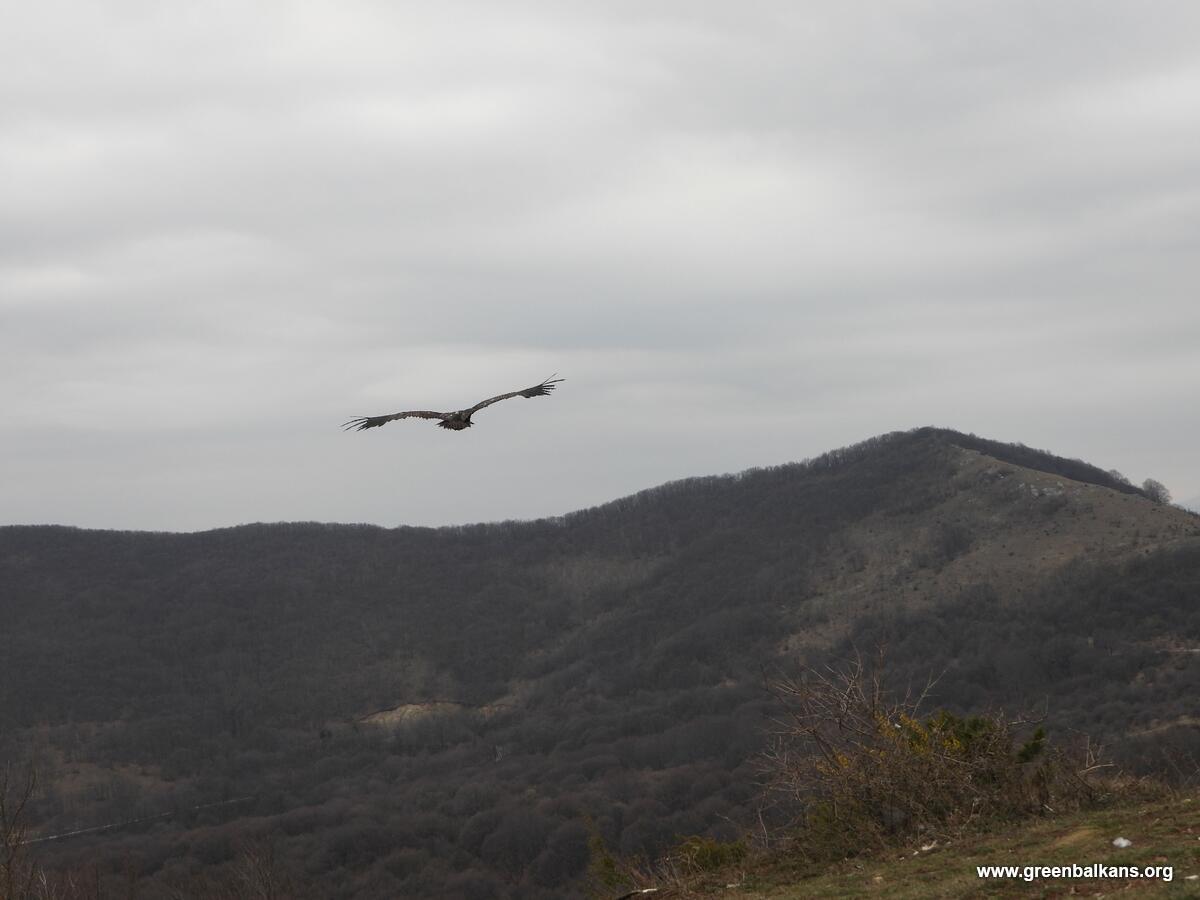
We are devastated to report that eleven Griffon Vultures fell victim to poisoning in the area of Klisoura Gorge in Greece. Unfortunately, nine vultures died from the incident, and two are alive but currently in recovery.
Eleven vulture victims so far
A total of eleven Griffon Vultures, a protected and critically endangered species in Greece, have been found poisoned in Klisoura Canyon in the Messolonghi-Etoliko Lagoon National Park a few days ago. This is the most severe poisoning case recorded in the country, after the one in the Strait of Nestos in 2012, and the largest confirmed case for Griffon Vultures.

The Messolonghi Management Body and HOS/BirdLife Greece discovered the carcasses of the nine Griffon Vulture. Executives from the Management Body of the Hunting Association of Messolonghi recovered the other two Griffon Vultures, which are currently alive and are being treated at ANIMA, gradually showing signs of recovery from poisoning. The dead vultures will be sent to the Athens Veterinary Foundations Centre for toxicological analysis, and to help avoid further poisoning.

Concerns about the fate of the rest of the vultures in the area are high and the danger of the local vulture population collapsing remains. The Griffon Vulture colony of Klisoura and Akarnania, are the only ones left in Western Greece and the largest remaining in the mainland.
This incident follows a serious incident two years ago in the same area, with a total of seven vultures poisoned.
The Messolonghi Forestry Office, in collaboration with the Messolonghi-Akarnanian Lagoon Management Body, will undertake all legal procedures to search for, identify and exemplify the perpetrator(s).
Riga, the Cinereous Vulture released with Vultures Back To LIFE in Bulgaria, is also in the nearby area. The project team is closely following her movements with GPS tracking to help ensure her safety.
Update 17/02/2020
The death toll increased from nine to eleven Griffon Vultures. It is possible that more vultures have been affected but not discovered.
Not only is this area the largest Griffon Vulture colony in mainland Greece but it is also an important wintering area for vultures. One of the visitors includes our Cinereous Vulture Riga, wintering there for the second year in a row. Vultures Back To LIFE released Riga in Bulgaria as part of the project’s efforts to reintroduce the species in the country. Just before the poisoning incident, Riga thankfully moved to the northernmost roosting site of the area near Embesos (60 km from Messolonghi) and returned to Messolonghi while the case was still unresolved on 13 February. The management body of the Messolonghi-Akarnanika area with the support of the Forestry Ministry initiated emergency action this past Friday to Sunday to protect Riga. The Vultures Back To LIFE staff was in constant contact with them and informing them of Riga’s movements with the transmitter every 30 minutes to ensure that the vulture would not get poisoned and to help the local team on the ground to discover the poison bait and react. In the end, Riga did not feed on the poison bait, nor the other Griffon Vultures with GPS transmitters that are now nesting in Akarnanika (50 km from Messolonghi).
The area is important for vultures in the Balkans and the Vultures Back to LIFE team aims to tag at least five more vultures with GPS transmitters, three provided by us at the VCF. GPS tracking will monitor the movements of the species, helping avoid further mass losses and addressing the prosecution towards poisoners.
Update 08/03/2020
Following the rehabilitation of the two Griffon Vultures at ANIMA, the vultures were nursed back to health and released back to the wild on 8 March! Ahead of their release, the vultures were equipped with GPS transmitters with the help of the Fund for Wild Flora and Fauna to monitor their movements and help tackle threats.
Illegal Wildlife Poisoning in Greece
The use of poison baits was banned in 1993 but it is still a widespread practice damaging wildlife, nature and public health. In less than three decades, populations of vultures, mainly in mainland Greece, have collapsed due to the illicit use of poison baits, while local extinctions of these species have occurred. In Greece, their population has declined dramatically, and all species of vultures in the country are in danger of extinction.
Urgent call to the locals
If you find dead birds or other animals in the area, please contact the following authorities immediately:
– The Mesolongi-Akarnanian Lagoon Management Body at 26320 55094
– The Messolonghi Forestry Office at 26310 28878
– The Hellenic Ornithological Society at 210 8228704 & 210 8227937 (daily 9am to 5pm) and 6947 610763 (24/7)
How the VCF tackles vultures’ biggest threat
The Vulture Multi-species Action Plan (Vulture MsAP), co-developed by us here at the Vulture Conservation Foundation (VCF), and endorsed by the Convention for Migratory Species (CMS), concludes that poison is the biggest threat to vultures worldwide and a significant part of this global action plan for vultures focuses on the actions needed to fight this threat. Furthermore, the Vulture MsAP is a global strategic blueprint identifying priorities and actions to conserve 15 species of old world vultures, approved in the conference of the parties of the Convention for Migratory Species, which states that poison with poisoned baits (often against predators of livestock) is the main threat to vultures worldwide.
We are actively pursuing different lines of work to fight this threat, among which is the Balkan Anti-Poisoning Project, funded by the MAVA Foundation. The project is working and funding local partners in six counties (Albania, Croatia, Bosnia-Herzegovina, Greece, North Macedonia and Serbia) to try to eradicate this illegal and highly damaging practice.
Balkan Anti-Poisoning Project

The Balkan Anti-Poisoning Project is a cross-border initiative bringing together wildlife conservation organisations, governmental agencies and other stakeholder such as; hunting associations, farmers and scientists, in six Balkan countries to tackle illegal wildlife poisoning.
Funded by the Mava Foundation we aim to secure real and continued engagement of the relevant national governmental authorities in the Balkan region against illegal wildlife poisoning and increase their capacity to counteract it and working together to take positive steps to protect vultures.
The Balkan Anti-Poisoning Project is a partnership between us here at the Vulture Conservation Foundation and the Albanian Ornithological Society-AOS, Protection and Preservation of Natural Environment in Albania-PPNEA, Ornithological Society “Naše ptice”,Association BIOM, Hellenic Ornithological Society-HOS, Macedonian Ecological Society-MES, Društvo za zaštitu i proučavanje ptica Srbije.
The Balkan Anti-Poisoning Project also contributes directly into the implementation of the Vulture Multi-Species Action Plan by carrying out anti-poisoning actions in Albania, Bosnia and Herzegovina, Croatia, Greece, North Macedonia and Serbia, and is building on our work for the last decade in the Balkans through the Balkan Vulture Action Plan.

Vultures Back To LIFE

Led by the wildlife conservation charity Green Balkans, with activities also implemented by the Fund for Wild Flora and Fauna, and bringing together partners from Bulgaria, Spain and Germany, Vultures Back to LIFE aims to reintroduce the cinereous or Eurasian black vulture to Bulgaria. The team will transfer and release around 60 birds, some from captive-breeding, but mostly coming from wildlife rehabilitation centers in Extremadura (Spain) into the wild in Bulgaria as well as creating supplementary feeding stations and improving populations of wild herbivores, improving the nesting conditions and creating artificial nest sites and tackling some of the major threats to vultures in the country such as insulating electricity pylons and illegal use of poison in the nature.

griffonvulture, cinereousvulture, vulturesbacktolife, Balkans Anti-Poisoning Project, 2020-02





